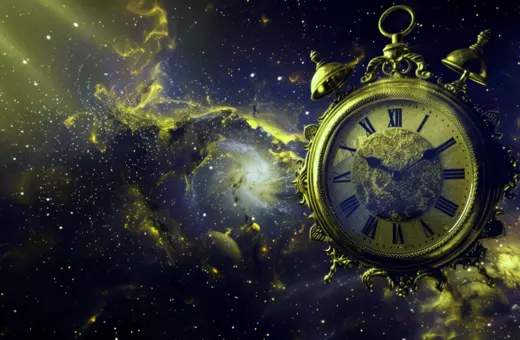“What is time? If no one asks me, I know what it is. If I wish to explain it… I do not know”, famously quipped Saint Augustine. Our modern understanding of time is more scientific than ever, and many of us likely do now think we know how to explain time. While impressively the Swiss atomic clock has a range of uncertainty of 1 second in 30 million years. But the time of physics is not real time. Time is not a mathematical abstraction, there is no line of time, and the present is not some indivisible zero-point on it.
Time is mathematical abstraction
From sundials and water clocks to hour glasses and weight-driven mechanical clocks, timekeeping devices have a long and fascinating history, driven mostly by an unrelenting quest for better precision. Nevertheless, we should remember that the usefulness of any timekeeping device depends on our gathering information through our senses, usually by looking—the location of the shadow projected on a sundial, the position of the hands of a clock, the readings of the vibrational frequency of a quartz crystal—and thus relates directly to our lived experience. A timekeeping device translates the ineffable experience of passage into the language of numbers. In doing so, it appears to reify time, giving it a mathematical precision comparable to that of physical measurements, such as distance, weight, speed, or pressure. The more precise the clock, the more distant clock time seems to be from becoming, passage, and duration.
Today’s timekeeping standard uses the frequency of specific electronic atomic transitions. Atoms have the advantage of bypassing irregularities in astronomical motions that require constant recalibration of clocks. The Swiss atomic clock FOCS-1, for example, relies on the frequency of electron jumps between energy levels in a cold cesium-133 atom, which is constant to very high accuracy so long as the clock remains in the same geographic location and at rest with respect to the ground. Under these conditions, the time interval of 1 second is currently defined as equal to 9,192,631,770 periods of orbital oscillations with this frequency. The FOCS-1 clock has the impressive uncertainty of 1 second in 30 million years.[1] The precision depends on the details of the experimental setup, consisting of a microwave cavity tuned to resonate with the electron jump frequency, like a parent pushing a child on a swing keeping the same period.
___
Infinitely divisible, physical time is a mathematical abstraction.
___
Still, no physical measurement can be absolutely precise. Every tool or device has an accuracy determined by its design. If a clock has a precision of a nanosecond (one-billionth of a second), it cannot be trusted to capture details of phenomena happening at scales of a picosecond (one-trillionth of a second). Thus, to every layer of reality based on measurements at a given scale, there is an underlying stratum that remains elusive. Even if, mathematically, we can divide time into smaller and smaller chunks, we could not expect to measure such shrinking time intervals ad infinitum. Infinitely divisible, physical time is a mathematical abstraction. The time line, a straight line covering the real numbers, is a useful tool for modeling time-varying phenomena with roots in the late Middle Ages (see chapter 2). It should not, however, be taken as representing the reality of time any more than a clock dial does.





















Join the conversation